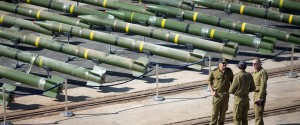Kerry: No Sanctions Against Conventional Arms and Missile Technology in Iran Nuclear Deal
Secretary of State Kerry appeared on a Reuters Newsmaker interview today with the apt title of Iran: Moment of Truth. He dropped another bombshell, this time about the lifting of UN sanctions barring Iran’s purchase of conventional arms and missile technology. Kerry indicated there would be snap back of arms sanctions. However, during a recent House Armed Services Committee Hearing, he admitted lifting of financial sanctions would enable deliveries of arms to terror proxies in the Middle East threatening both Americans and Israelis.
Iran demanded and the Administration negotiating team consented to lift bans on Iranian purchases of conventional arms and missile technology adopted under 2010 UN Security Resolution 1929. At the time of the adoption of those UN sanctions both Israel and the US had objected to the sale of the Russian S-300 system to Iran. This comes in the wake of a trip to Moscow on July 24th by Qod’s Force commander Gen. Qassem Soleimani to expedite the delivery of the advanced Russian S-300 air defense system . Russian’s Putin had lifted the ban in mid- April 2015 following the announcement of the framework for the final Joint Comprehensive Plan of Action (JCPOA). The JCPOA was announced in Vienna on July 14th and unanimously endorsed by the UN Security Council on July 22nd. This was just prior to Gen. Soleimani’s trip to Moscow to meet both Putin and Russian Defense Minister Shogui. Add to that the announced $10 billion dollar oil barter deal with China for stealth fighter jets and it would appear that once again, Iran has been allowed to breach conventional arms sanctions. Russian Foreign Minister Lavrov had suggested that expediting lifting these arms sale bans would enable sales would enable Iran and Syria to combat the Islamic State.
Reuters reported these latest revelations by Kerry:
Violations of an arms embargo by Iran or restrictions on its missile program would not force an automatic reinstatement or “snapback” of United Nations sanctions under a landmark nuclear deal, although other options would be available, U.S. Secretary of State John Kerry said on Tuesday.
“The arms embargo is not tied to snapback,” Kerry said. “It is tied to a separate set of obligations. So they are not in material breach of the nuclear agreement for violating the arms piece of it.”
“There is a specific U.N. resolution outside of this agreement that prohibits them from sending weapons to Hezbollah. There is a separate and specific U.N. resolution that prohibits them from sending weapons to the Shia militia in Iraq,” he said.
Kerry added that similar U.N. restrictions banned arms sales to the Houthis in Yemen, North Korea and other potential recipients of weapons from Iran.
Tehran has consistently violated the U.N. arms embargo and missile sanctions. Since 2010, those breaches have been documented by the U.N. panel of experts on Iran.
Kerry said a new U.N. monitoring mechanism would have to be created to replace the panel of experts, suggesting that much of the monitoring work could be done by the United States and its allies on their own.
“We’re not dependent on the U.N. to do that and I think Israel and others are much happier that we’re not,” he said. “We will depend on our own intel community, on our own military, on our own information, we will work with Israel, and we will work with others.”
Iran’s senior nuclear negotiator Abbas Araqchi made clear last month that Tehran had no intention of complying with the arms embargo and missile sanctions.
“Whenever it’s needed to send arms to our allies in the region, we will do so,” he said. “We are not ashamed of it.”
Watch the Washington Free Beacon YouTube video of Secretary Kerry’s Reuters Newsmaker interview:
Watch this response by Kerry to this issue in this C-Span video clip during a House Hearing Armed Services Committee Hearing:

M-302 missiles captured by Israeli Naval commandos on display in Eilat March 2014Source: AP/Ariel Schalit.
Notwithstanding and even before the 2010 UN conventional arms sanctions were adopted, Israel has unilaterally intercepted shipments attacked arms deliveries to Iranian proxies, Hezbollah and Hamas. Israel is not waiting around for implementation of UN arms control and missile technology sanctions or any Presidential executive orders by the Obama Administration to defend against Iran violations. Israel naval commandos intercepted Iranian shipments of conventional arms and missiles in both the Mediterranean off Gaza and in the Red Sea. In March 2014 the Klos C was boarded by Israeli Naval commandos in the Red Sea and brought to the Port of Eilat. Multiple IAF attacks on missile and other weaponry prevented deliveries for proxy to Hezbollah in both Syria and Lebanon’s Bekaa Valley.
In an NER/Iconoclast post yesterday on” Obama’s Dangerous Spin on Iran Nuclear Deal,” this writer suggested the latest conventional arms sanctions by Iran with the connivance of both Russia and China may have jeopardized any military option by the U.S. or Israel. I suggested that this was a breach of both UN travel bans on the Quds Force Commander as well as the UN Resolution 1929 sanctions against purchase of conventional weapons and missile technology precluded by both five and eight year sunsets under the JCPOA. It makes any military option harder by orders of magnitude. While both the U.S. and Israel aren’t without resources of their own, Iran’s breaches of sanctions makes the decision to use American of Israeli military power more complicated. Kerry’s Reuters Newsmakers interview comments today virtually confirmed that assessment.
EDITORS NOTE: This column originally appeared in the New English Review. The featured image is of U.S. Secretary of State John Kerry in New York August 11, 2015. Source: Reuters/Brendan McDermid.



Trackbacks & Pingbacks
[…] The president agreed. […]
Leave a Reply
Want to join the discussion?Feel free to contribute!